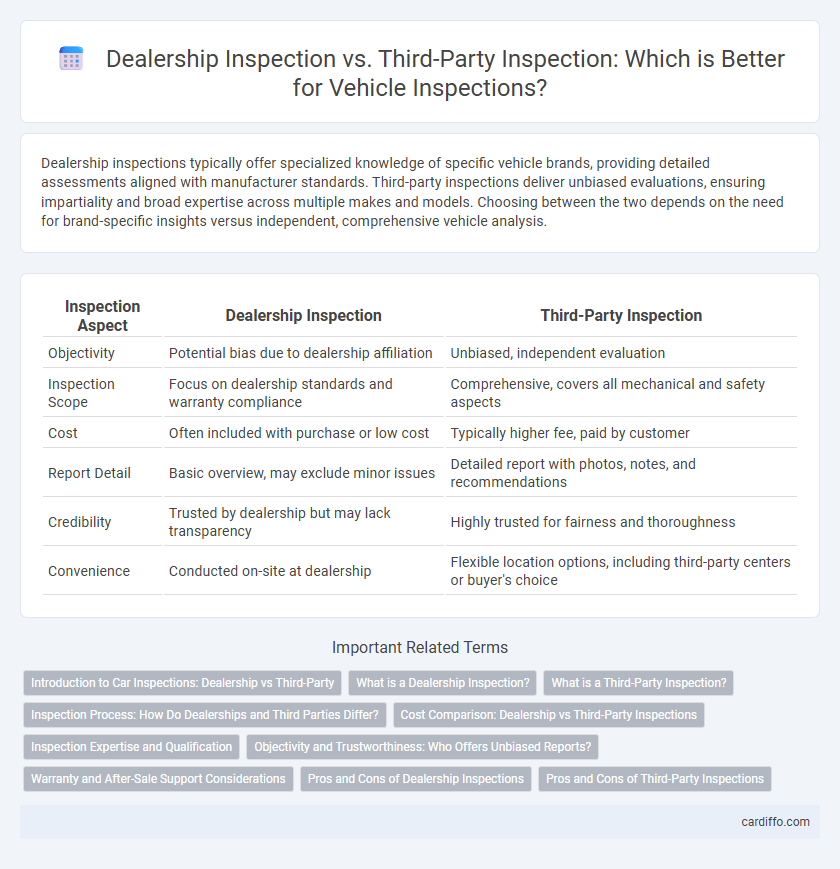Dealership inspections typically offer specialized knowledge of specific vehicle brands, providing detailed assessments aligned with manufacturer standards. Third-party inspections deliver unbiased evaluations, ensuring impartiality and broad expertise across multiple makes and models. Choosing between the two depends on the need for brand-specific insights versus independent, comprehensive vehicle analysis.
Table of Comparison
| Inspection Aspect | Dealership Inspection | Third-Party Inspection |
|---|---|---|
| Objectivity | Potential bias due to dealership affiliation | Unbiased, independent evaluation |
| Inspection Scope | Focus on dealership standards and warranty compliance | Comprehensive, covers all mechanical and safety aspects |
| Cost | Often included with purchase or low cost | Typically higher fee, paid by customer |
| Report Detail | Basic overview, may exclude minor issues | Detailed report with photos, notes, and recommendations |
| Credibility | Trusted by dealership but may lack transparency | Highly trusted for fairness and thoroughness |
| Convenience | Conducted on-site at dealership | Flexible location options, including third-party centers or buyer's choice |
Introduction to Car Inspections: Dealership vs Third-Party
Car inspections performed by dealerships often focus on manufacturer-specific standards and may include proprietary diagnostic tools that ensure compliance with warranty requirements. Third-party inspections provide an unbiased evaluation and detailed condition reports, making them valuable for independent verification before purchase or sale. Understanding the distinctions between dealership and third-party inspections helps consumers choose the most suitable option for vehicle assessment and peace of mind.
What is a Dealership Inspection?
A dealership inspection is a comprehensive vehicle assessment conducted by certified technicians at an authorized car dealership, focusing on manufacturer-specific standards and warranty requirements. This inspection typically includes a detailed check of the engine, transmission, brakes, suspension, and electronic systems to ensure optimal performance and safety. Dealership inspections provide accurate diagnostics backed by proprietary tools and update any necessary software or recalls directly approved by the vehicle's manufacturer.
What is a Third-Party Inspection?
A third-party inspection is conducted by an independent organization that evaluates a dealership's vehicles or services to ensure unbiased quality and compliance with industry standards. These inspections provide an objective assessment free from the dealership's internal influences, helping buyers make informed decisions. Third-party inspections often include detailed reports on vehicle condition, safety features, and overall performance.
Inspection Process: How Do Dealerships and Third Parties Differ?
Dealership inspections often emphasize brand-specific standards and may include promotional services, while third-party inspections provide unbiased assessments based on independent criteria. Dealerships typically use technicians trained on manufacturer guidelines, whereas third-party inspectors apply universal checklists to evaluate vehicle condition. This difference in approach affects the thoroughness and objectivity of the inspection process, influencing buyer confidence and vehicle valuation.
Cost Comparison: Dealership vs Third-Party Inspections
Dealership inspections typically cost between $100 and $200 due to comprehensive checks and branded service guarantees, whereas third-party inspections average $50 to $150, offering more affordable yet unbiased evaluations. Dealerships often include additional services in their fees, such as recall checks and warranty validation, which may be extra charges in third-party inspections. Choosing between the two depends on whether cost savings or manufacturer-specific expertise is prioritized for vehicle inspection.
Inspection Expertise and Qualification
Dealership inspections are typically conducted by factory-trained technicians who possess specialized knowledge and access to manufacturer-specific diagnostic tools, ensuring a thorough evaluation aligned with dealership standards. Third-party inspections are performed by independent experts certified by recognized industry organizations, offering unbiased assessments with broad experience across multiple vehicle makes and models. Both approaches emphasize rigorous qualification requirements, but dealership inspections prioritize brand-specific expertise, while third-party inspections highlight impartiality and comprehensive inspection protocols.
Objectivity and Trustworthiness: Who Offers Unbiased Reports?
Dealership inspections often carry a risk of bias as they may prioritize sales objectives, while third-party inspections are conducted independently, ensuring greater objectivity and trustworthiness. Third-party inspectors adhere to standardized protocols and unbiased criteria, providing transparent and reliable reports that buyers can confidently trust. This impartiality makes third-party inspections the preferred choice for securing an honest evaluation of a vehicle's condition.
Warranty and After-Sale Support Considerations
Dealership inspections often include warranty coverage and after-sale support as part of their service agreements, ensuring repairs and maintenance are handled within authorized channels. Third-party inspections provide unbiased assessments but typically do not extend warranty benefits or direct after-sale support, emphasizing independent evaluation over ongoing service. Evaluating the balance between warranty protection and objective inspection results is crucial for informed vehicle purchasing decisions.
Pros and Cons of Dealership Inspections
Dealership inspections offer thorough evaluations by technicians familiar with specific vehicle makes, ensuring accurate diagnostics and access to genuine parts, but they often come at a higher cost and may involve upselling unnecessary services. These inspections provide comprehensive warranty coverage benefits and maintain service records within the dealership network, enhancing resale value. However, potential bias towards dealership services and longer wait times can limit consumer flexibility compared to independent third-party inspections.
Pros and Cons of Third-Party Inspections
Third-party inspections offer unbiased evaluations by independent experts, reducing potential conflicts of interest found in dealership inspections and increasing buyer confidence. These inspections often reveal hidden defects and provide detailed reports, but they can incur additional costs and may require coordination outside dealership schedules. Relying on third-party inspections lessens the risk of overlooking vehicle issues, enhancing transparency in used car transactions.
Dealership inspection vs third-party inspection Infographic

 cardiffo.com
cardiffo.com